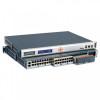Lantronix SLC 8000 Advanced Console Manager User Guide - Page 226
Script Commands, Batch Script Syntax, Interface Script Syntax, To use a script at the CLI
 |
View all Lantronix SLC 8000 Advanced Console Manager manuals
Add to My Manuals
Save this manual to your list of manuals |
Page 226 highlights
9: Device Ports To use a script at the CLI: 1. To run an Interface Script or a Custom Script on a device port for pattern recognition and action generation, use the connect script deviceport command. This action requires that a SLC user running the connect script command have Device Port Operations (do) rights and port permissions for the selected device port. 2. To run a Batch Script at the CLI with a series of CLI commands, or a Custom Script for pattern recognition and action generation, use the set script runcli command. This action requires that a SLC user running the runcli command belong to a group that is the same or greater than the group assigned to the script (e.g., if the script is assigned to the Power group, the user running the runcli command must belong to the Power or Admin group). For Batch Scripts, if this minimum group requirement is met, the SLC user will temporarily be granted all of the individual rights assigned to the script while the Batch Script is running. Note: Expect Custom Scripts have a debug enable option that supports printing Expect debug information to aid in creating an Expect script. The debug option is not supported for Tcl and Python scripts. Script Commands Go to Script Commands to view CLI commands which correspond to the web page entries described above. Batch Script Syntax The syntax for Batch Scripts is exactly the same as the commands that can be typed at the CLI, with the additions described in this section. The sleep command suspends execution of the script (puts it to 'sleep') for the specified number of seconds. Syntax: sleep The while command allows a loop containing CLI commands to be executed. Syntax: while {} { CLI command 1 CLI command 2 ... CLI command n } Note: The closing left brace '}' must be on a line without any other characters. To support a while command, the set command, variables, and secondary commands are also supported. Interface Script Syntax This section describes the abbreviated scripting syntax for Interface Scripts. This limited syntax was created to prevent the creation of scripts containing potentially harmful commands. Script commands are divided into three groups: Primary, Secondary and Control Flow. Primary commands provide the basic functionality of a script and are generally the first element on a line of a script, as in: send_user "Password:" SLC™ 8000 Advanced Console Manager User Guide 226















